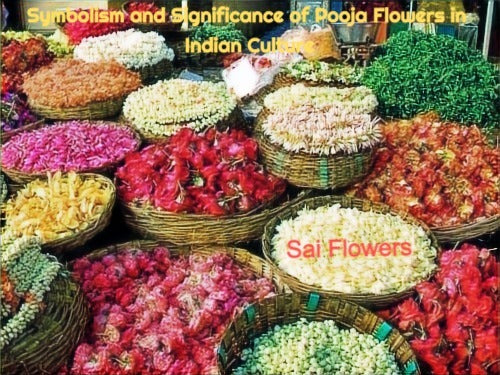
Flowers play a significant role in the Indian religious practice known as pooja, or worship. Here are some examples of the pooja flowers' symbolism and significance in Indian culture.
Indian Flowers can be used on many occasions in many different ways. They are used for
Pooja Rituals (To Worship God).
Wedding Purpose.
Religious and Cultural Activities.
Festival Occasions.
Baby Showers.
Decoration.
Pooja Rituals (To Worship God)
Worship rituals, or poojas, are essential to many religious practices worldwide. These ceremonies include a number of ceremonial actions and gifts that devotees make in order to express respect, and thanks, and request blessings from their respective deities or gods. Numerous pooja rituals share some common elements, despite the fact that specific rituals may vary among various religions and cultural traditions. There are typical components involved in pooja rituals like Preparation, Pooja Mandap, Offering Mantras and Chants, Aarti, Meditation, and Distribution of Prasad.
Wedding Purpose
Flowers have deep cultural and symbolic meaning in India, where they are frequently used for ceremonial occasions like weddings. Here are some explanations for why flowers are used in Indian weddings like Auspiciousness, Symbol of Beauty, Cultural Customs, Fragrance and Freshness, and symbol of love.
Religious and Cultural Activities
Flowers hold a sacred place in religious and cultural activities, whether they take place in temples, churches, mosques, or cultural celebrations. They foster a sense of devotion, beauty, and harmony in these practices, enhancing the spiritual experience, adding aesthetic appeal, and communicating profound meanings.
Festival Occasions.
Festival occasions benefit greatly from the beauty, fragrance, symbolism, and cultural significance that flowers bring to the festivities. They enhance the overall experience of joy, devotion, and cultural identity during these special occasions by adding to the festive mood, evoking a sense of spirituality, and adding to the festive atmosphere.
Baby Showers
Baby showers are made more beautiful, symbolic, and joyous by lowers. They add to the happy mood, express feelings and good wishes, and elevate the occasion a bit. Flowers are a flexible and significant component that improves the overall celebration of a new baby's impending arrival.
Decoration
Due to their cultural significance, vibrant colors, and rich symbolism, Indian flowers hold a significant amount of value in decoration.
Indian flowers are essential for decoration because they infuse the space with cultural significance, vibrant colors, fragrance, and symbolism. They evoke a sense of tradition, joy, and spirituality in various celebrations and events by generating an authentic and aesthetically pleasing atmosphere.
Indian flowers that are frequently used include the following:
Jasmine: used as hair ornaments for women and in religious ceremonies and weddings.
Rose: used to make rosewater, as well as for religious offerings, garlands, and wedding decorations. Available in Different Colors Orange, Pink, Yellow, and Red. And Used for Rose Wedding Garlands.
Lotus: represents spirituality, purity, and heavenly beauty. Used as decorations, offerings, and rituals in religion.
Marigold: It is renowned for its vivid colors, especially hues of yellow and orange.
Arali: In Indian culture, the arali flower is significant. It is renowned for its scent and vibrant color aesthetic. The flowers are exported as loose ones and presented to Indian deities.
Lily Sampangi: Large, sophisticated, and easily recognizable thanks to their trumpet-shaped blooms are lily flowers. Importance is a Symbol of Purity and Beauty, Floral Arrangements and Decorations, Significance in Funerals

